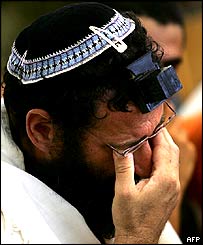
The Netzarim settlers were tearful but defiant
|
The removal of 8,500 Israelis from 21 settlements in the Gaza Strip is complete, Israel's army commander in the region has said.
"Right now there are no Israeli settlements in the Gaza Strip," said Maj-Gen Dan Harel.
He was speaking after the last Jewish settlement - Netzarim - was evacuated following tearful prayers by residents.
Stiff resistance is expected in the West Bank, when forced eviction starts at two settlements on Tuesday.
Thousands of troops are now being redeployed to the West Bank for the final piece of the operation.
After the Gaza pull-out, the Israeli and Palestinian leaders spoke by phone - their first conversation for two months.
Palestinian Prime Minister Mahmoud Abbas had called Ariel Sharon and expressed hope the withdrawal would open a new page in relations, Mr Sharon's office said.
President George W Bush hailed the Gaza evacuation as an "historic step" that would bolster the search for peace in the Middle East.
Defiance
Netzarim was one of the first settlements to be erected in Gaza.
Israeli police and soldiers moved into the settlement without any resistance, going door-to-door telling settlers it was time to go.
 |
 You can destroy our homes, but not our spirit
You can destroy our homes, but not our spirit

|
Then everyone gathered in the synagogue for more than three hours of emotional singing, chanting, prayers and speeches.
The protesters, many of whom were almost in a state of hysteria, allowed themselves to be carried onto the waiting buses.
Some held banners aloft saying: "You can destroy our homes, but not our spirit."
"We are leaving against our will, but we are not going with our heads bowed," said Rabbi Zion Tawil.
"The saplings which are being uprooted here, we will replant throughout the country until we make our return to Netzarim."
This settlement of Netzarim was among the most hated by the Palestinians, who have been kept away from its walls and fences by guns and acres of bulldozed land.
"They are very bad neighbours," said Saadi Helo, a Palestinian farmer quoted by the Associated Press news agency.
"They turned our lives into nightmares. They occupied the land, levelled our farms, demolished our houses, killed our beloved and spared no effort to attack us."
'Painful situation'
Israeli Prime Minister Ariel Sharon, the architect of the withdrawal plan, earlier visited some of the troops involved in the emotional clearances from Gaza and praised their work.
Mr Sharon also praised the way settlers had dealt with the operation, in what he called a "very difficult and painful situation".
Residents of two West Bank settlements due to be evacuated have already left, but an estimated 2,000 activists have gathered at two others - Sanur and Homesh - and are expected to mount fierce resistance.

Palestinians use the beach to bypass sealed-off Netzarim
|
Reports in Israel's media have suggested that extremist settlers gathered there could resort to violence to resist eviction.
The military says armed troops may be deployed to clear the two settlements, a shift from the policy in Gaza where all troops were unarmed.
But the BBC's Matthew Price, in Sanur, reports that settlers have handed in their weapons and have pledged to resist eviction fiercely but without violence.
Israeli bulldozers have been demolishing homes in the empty Gaza settlements.
The demolition work - expected to take several weeks - is being carried out in agreement with the Palestinian Authority, which will assume responsibility for the land once the Israeli army has left.
The final departure of troops is expected within about a month, once army bases and military installations have been dismantled.
The Palestinian Authority is expected to use much of the land to build new housing for Gaza's overcrowded population.

